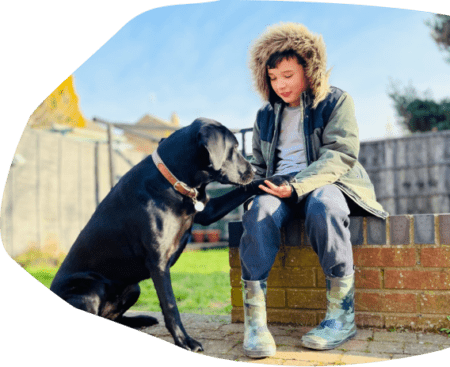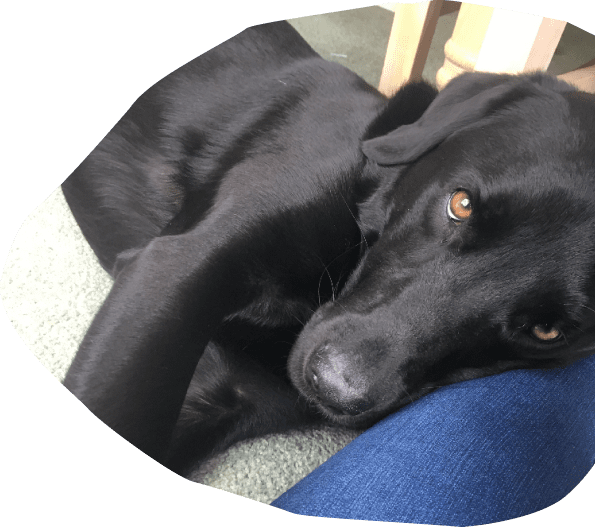Autism Acceptance Week 2023 runs from 27th March to 2nd April. We’re sharing stories and reflections from our Dogs for Good family about what autism acceptance means to them and the positive impact of dogs to help make life possible for autistic people and their families.
Emma, Albie and assistance dog Dougie

Labrador Dougie supports Albie to help him feel safe when he’s out and about. With Dougie by his side, wearing his Dogs for Good jacket, people understand that Albie needs support. Having Dougie makes it clear that we need a little bit of extra kindness, not judgement. And it’s astonishing. People don’t always know how to talk about autism but they know how to talk about dogs and I’m more than happy to fill in the knowledge gaps!
Katie Steel – Autism Assistance Dog Instructor
Dogs provide a bridge for acceptance, I think. They have a positive focus, help with engagement, are non-judgmental and accept everyone for who they are. Dogs embody acceptance. Our autism assistance dogs help children navigate the world without pressure and at their own pace, are there as loyal companions, providing a calming focus and the way they make life possible for a child with autism is pretty amazing.
Mum Claire, Elsa and their pet dog Minnie

Autism Acceptance to me is about everyone understanding autism better so Elsa can just be who she is, without having to fit into other people’s perceptions of what ‘normal’ is. It’s a big piece of work and we certainly need more than a week!
Our Cockapoo, Minnie, does all of that. She accepts Elsa for who she is, doesn’t ‘see’ autism and doesn’t judge. She just loves Elsa. She delivers good in so many ways and just recently, has helped Elsa start her day in a positive way simply by going to her bedroom and delivering some very tickly licks. Which make Elsa giggle. And as far as I’m concerned, giggling is a very good way to start the day!
We are two and a half years into our journey to help both our daughter and our Cockapoo understand each other and read their own individual signs. Sometimes it doesn’t work and sometimes, just sometimes, it really, really does. And for all the tricky times, THIS is why we did it … If we can have a few of these calm, peaceful and beautiful moments just every now and again, we are truly winning.
Cari Miles – Family Dog Instructor
For me, it means feeling safe to talk openly about being autistic, where people listen and understand without jumping to their own conclusions. It’s about teaching the world that there’s more to autism than they may think, and that it’s not something that must be hidden away and kept secret.
Pet dogs can help give families the confidence to get out and about, to speak to others, and publicly celebrate how much their dog has made a difference. Simply by doing this, the stories are positive, and celebratory, and part of normal day-to-day conversation.
Mum Alison talking about her daughter and their pet dog Harvey

The moment our black Lab, Harvey came into our daughter’s life things started to change, not just for her, but the whole family. Autistic children are often very lonely and have few friends; but along came our wonderful puppy and she blossomed, her confidence grew and her self-esteem increased.
Harvey would accompany her on the walk to school and he became a talking point, making it easier for her to engage and be accepted by other children. The school were very supportive of the relationship between the two, Harvey kept her calm, and they even suggested that he sit with her while she sat her GCSE exams.
Harvey also helped us as parents, as autistic families can become isolated. On dog walks people stopped and spoke with us and we made connections and friendships. We have even made friends with another family with an autistic child who attended the Dogs for Good Family Dog workshops.
Hannah Beal – Family Dog Instructor
Autism acceptance to me means moving towards living in a world where everyone is seen as their own person. In my role as Family Dog instructor, I see lives change in extraordinary ways because of the positive addition of a pet dog to the family.
Mark feels more confident after spending time with Fleck
Mark’s life had become very isolated and as he describes, confined to a small room, rarely venturing out. With support from our community dog programme, Mark worked with Fleck, Lucy and Ursa alongside handler Sarah. Gradually, Mark learned about caring for the dogs and enjoyed spending time with him. With every visit, Mark gained more confidence and began to feel able to do more things. Says Mark: “I never used to have any contact with the community. Now, I’m more confident and I’m happier too. I go swimming with my dad and I go to the gym too. I’m much more relaxed.”
